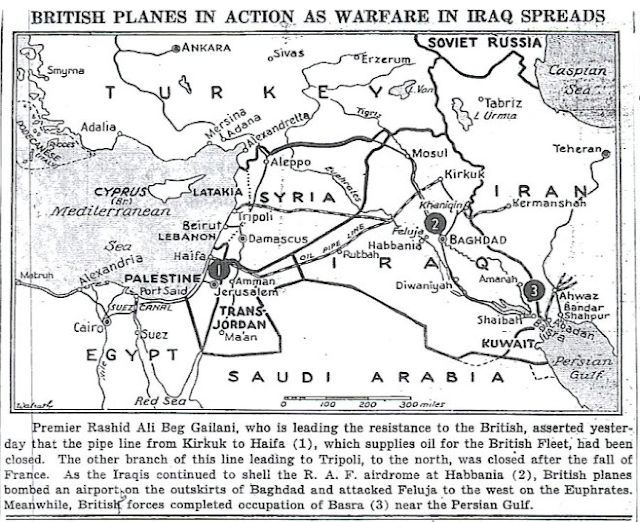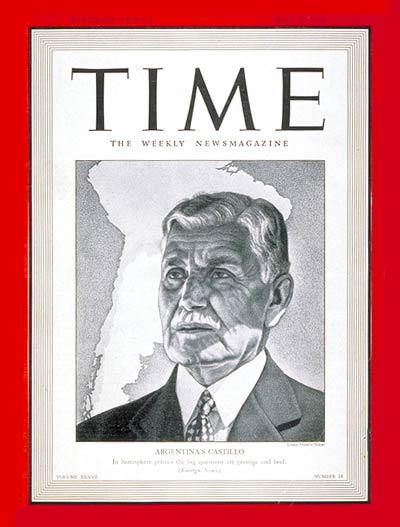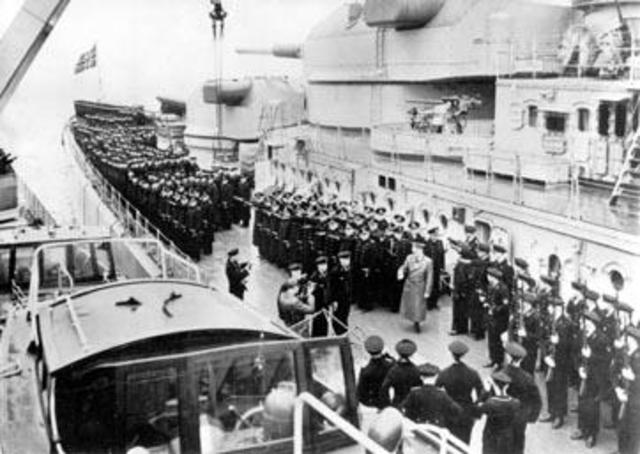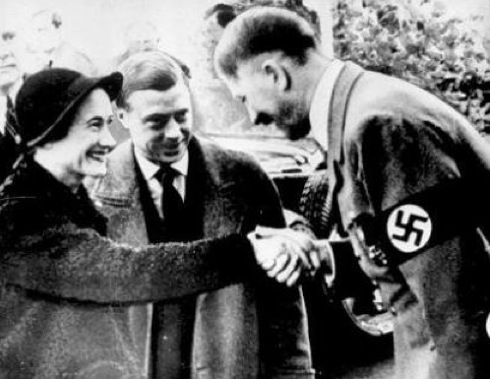Tuesday 13 May 1941
 |
| German battleship Bismarck as seen from cruiser Prinz Eugen during refueling exercises, 13 May 1941. |
Vichy French weapons already are arriving in Mosul from Syria. The first shipment includes 15,000 rifles, 6 million rounds of ammunition, 200 machine guns, four 75mm field guns, and 10,000 artillery shells.
The Grand Mufti of Jerusalem, in exile in Baghdad, renews his calls for a jihad against the British from Baghdad.
 |
| A Bristol Beaufighter MkI RAF of 217 Squadron (W6494) shot down at Carpiquet airfield, Caen, France, 13 May 1941. |
The damage to London is growing and alters daily life there. The chamber of the House of Commons is in ruins, so the MPs must meet in Church House, Westminster. Prime Minister Winston Churchill states there that "Parliamentary business will not be interrupted by enemy action." Big Ben is damaged, but still functional. The historic hammer-beam roof of Westminster Hall is intact, but the lobby roof is destroyed. Westminster Abbey also has lost its lantern roof for lack of water to fight the fires - something that the Luftwaffe helped cause by timing its recent mass raid of 10-11 May to low tide in the Thames.
The list of damaged and destroyed architectural treasures goes on and on:
Tower of LondonThe London Palladium Theatre has a lucky escape - a parachute mine of devastating power crashes through the roof but catches on the beams, remaining suspended above the stage. It later is removed and intentionally exploded elsewhere.
British Museum
Tower Pier
Royal College of Surgeons
Gray's Inn and Lincoln's Inn
Law Courts
Victoria Station
War Office
Scotland Yard
Lambeth Palace
The Deanery
15 hospitals, including Charing Cross and St. Thomas'
Numerous Christopher Wren churches.
RAF Bomber Command attacks Heligoland with 44 aircraft, while the Luftwaffe sends 40 aircraft against shipping targets along the Channel coast.
East African Campaign: The Indian troops of the 5th Indian Division renew their attacks on the Italian stronghold of Amba Alagi. They attack the Twin Pyramids position. The newly arrived 1st South African Brigade prepares to join in the attacks on the 14th. The Italians continue to put up fierce resistance, but they have no source of supply and small stockpiles of essential goods such as food and water.
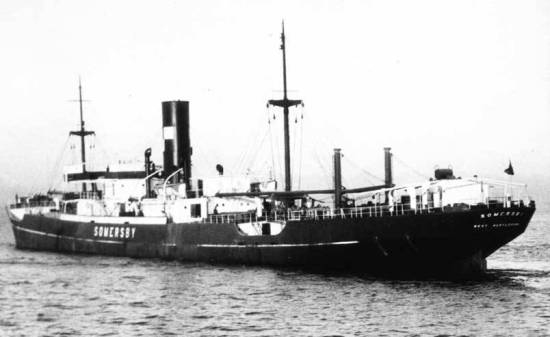 |
| SS Somersby, sunk on 13 May 1941 by U-111. Everyone on board survives. |
Salopian is badly damaged, losing engine power and wireless communications, but it opens fire anyway. This forces U-98 to submerge. Gysae pumps two more torpedoes into the stricken AMC at 08:00 and 08:50, but it stays afloat. Finally, the sixth torpedo from U-98, fired at 10:43, causes the Salopian to split in two. It sinks in two minutes.
Overall, Gysae has to use nine torpedoes, an extraordinary number to sink one ship and over half the normal U-boat load. The Salopian's survival for so long is partially due to the practice of filling the holds of AMCs with empty barrels and other buoyant material. Despite the ship's dramatic ending, only three men perish, and the 228 men on the ship are picked up by HMS Impulsive on the 14th.
U-105 (Kptlt. Georg Schewe) is operating about 700 miles off of Freetown when it spots 6434-ton British freighter Benvrackie, part of Convoy OB-312. The U-boat had suffered from the explosion of its 105mm deck gun on 5 May but remains serviceable. Schewe torpedoes the Benvrackie, sending it to the bottom. The Benvrackie had picked up 25 survivors from the Lassell on 30 April, sunk by U-107, and 15 of those survivors now perish in this sinking. In addition, 13 crew of the Benvrackie perish, for a total of 28 deaths. There are 55 survivors, ten of both sinkings, and they must spend 13 days in lifeboats until picked up by HMHS Oxfordshire. The Benvrackie's master, William Edward Rawlings Eyton-Jones, was awarded the Lloyd's War Medal for bravery at sea.
 |
| U-105 during a mid-ocean rendezvous with another U-boat during World War II. |
British 496 ton hopper barge F hits a mine and sinks just 350 yards south of Dingle Oil Jetty at Liverpool. There are five deaths and six survivors.
The Luftwaffe bombs and sinks 203-ton British trawler Fort Rona about 15 miles southwest of Bardsey Island (which lies 1.9 miles (3.1 km) off the Llŷn Peninsula in the Welsh county of Gwynedd). Everyone survives.
A Spanish fishing trawler, Nueva Elisa, hits a mine and sinks in the Bay of Biscay.
The Luftwaffe bombs and damages 2468-ton British freighter Lottinge about three miles off the mouth of the Tyne. The Lottinge makes it back to port.
The Luftwaffe bombs destroyer HMS Franklin in the North Sea, but a near miss does not cause significant damage.
German battleship Bismarck and cruiser Prinz Eugen practice refueling at sea in preparation for their upcoming sortie into the Atlantic.
Royal Navy destroyer Lance (Lt. Commander Ralph W. F. Northcott), corvette Clover (Lt. Commander Frank A. Shaw) and ASW trawler Valse (Lt. Donald S. Hutton) are all commissioned.
Australian minesweeper HMAS Townsville is launched.
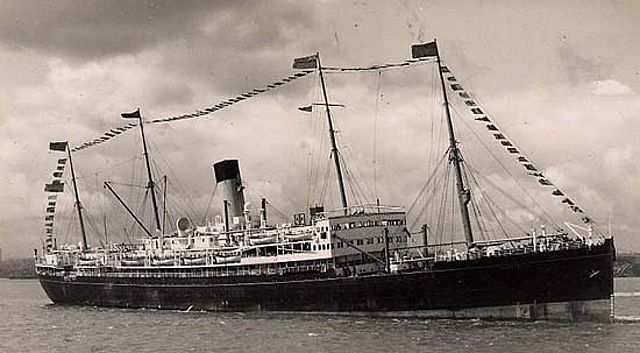 |
| SS Shropshire before its conversion into HMS Salopian (F 94) (Photo Courtesy of Library of Contemporary History, Stuttgart). |
It is much better to provide ample forces in war so as to achieve a swift result, rather than to budget for a continued flow of wastage over a long period of months. I am therefore of the opinion that we should send all we can from [England] at the very earliest moment.Churchill says that he has asked the Admiralty to consider sending a repeat of the Tiger Convoy and also to return some convoy ships from Alexandria to England via the same direct route.
The British start preparing for Operation Brevity, a small offensive planned for the Libyan/Egyptian border. The Luftwaffe notices the growing troop concentrations and attacks them.
Operation MD 8, composed of light cruisers HMS Ajax and Orion and HMAS Perth, accompanied by three destroyers, departs from Alexandria. The objective is to bombard El Fateyah airfield near Derna. They get lost in the dark and fail to fire a shot.
Royal Navy gunboat HMS Gnat parks offshore during the night and bombards Galala Airfield.
The Luftwaffe bombs Malta, sinking tug Cornflower at Mersa. The strange case of the "Miracle" bell happens when a church bell used to warn of impending air raids tolls at 14:00, sending residents of a home for the elderly and disabled in Qomi to shelters. Seconds later, the building is bombed and destroyed. However, the church had not been informed of an impending raid, and nobody admits to ringing the bell. The Spiritual Director of the building ascribes it to "truly miraculous deliverance."
 |
| A Mennonite farmer in Lancaster with a load of tobacco, May 1941. |
Spy Stuff: A German consul in Chunking, China has access to Soviet secret diplomatic circulars. He reports today, on May 7th, the Soviets had instructed all missions to ascertain the probable attitude of other countries in the event of a German-Soviet conflict. Since the Soviets are presumed not to know about Operation Barbarossa, this suggests to the Germans that the Soviets are planning an attack of their own. This jibes with military intelligence gained after the invasion which claims that Stalin had made many warlike statements to graduates of Moscow staff colleges on 5/6 May.
Professor Karl Bömer, head of the Foreign Press Department, is at a diplomatic reception in the Bulgarian embassy in Berlin when he states in a drunken stupor to diplomats and journalists that he in line to be promoted to Gauleiter of the Crimea. Of course, the Crimea is a Soviet possession well behind the frontier, and this comment draws a lot of attention. Bömer is brought up on charges and sentenced by the People's Court for "negligent treason" to three years in prison. Bömer later is sent to the army to serve in Russia, where he perishes in 1942.
Partisans: Yugoslav Army Colonel Dragoljub Mihailovich establishes new headquarters on the western slopes of the remote Suvobor Mountains in Serbia. Mihailovic is a royalist whose ultimate goal is the restoration of the monarchy. His resistance movement, one of the first open resistance movements within Occupied Europe, is called the Ravna Gora.
Anglo/Vichy French Relations: It is fair to say that Vichy France is caught between the millstones of the Reich and Great Britain at this time, and relations with both are murky at best. Both sides have been reaching separate agreements with Vichy, some public but many private. The Royal Navy is the flashpoint for many incidents, and one happens today which threatens to poison relations between the two powers.
Royal Navy armed merchant cruiser (AMC) Bulolo seizes 4484 ton Vichy French freighter Bourbonnais several hundred miles southwest of Dakar. The Bourbonnais, however, have time to send out a distress call that is received in Dakar, and the French authorities there are tired of having their ships seized on the high seas. They send out destroyers Fantasque and Terrible to "assist" the Bourbonnais. More ships follow. However, they can't find the Bulolo and Bourbonnais.
German/Turkish Relations: German ambassador to Turkey Franz von Papen, former chancellor of Germany and Vice-Chancellor in 1933-34 under Hitler, reports from Ankara. He indicates that Turkey is increasingly favorably disposed to the Reich. Turkey, due to von Papen's influence, is steadily increasing its trade with the Reich.
US/Australian Relations: Prime Minister Robert Menzies travels from Washington to New York and addresses the Council on Foreign Relations dinner at the Ritz Carlton Hotel. He states:
. . . for parliamentary liberty and the ordered rights of self-government are our joint and several heritage. . . . it is essential for the world not only that tyranny should be defeated but that it should be defeated quickly before the scars made by it are too deep and too lasting.Menzies soon will head west on his epic circumnavigation that includes meetings with virtually of the world's Allied leaders.
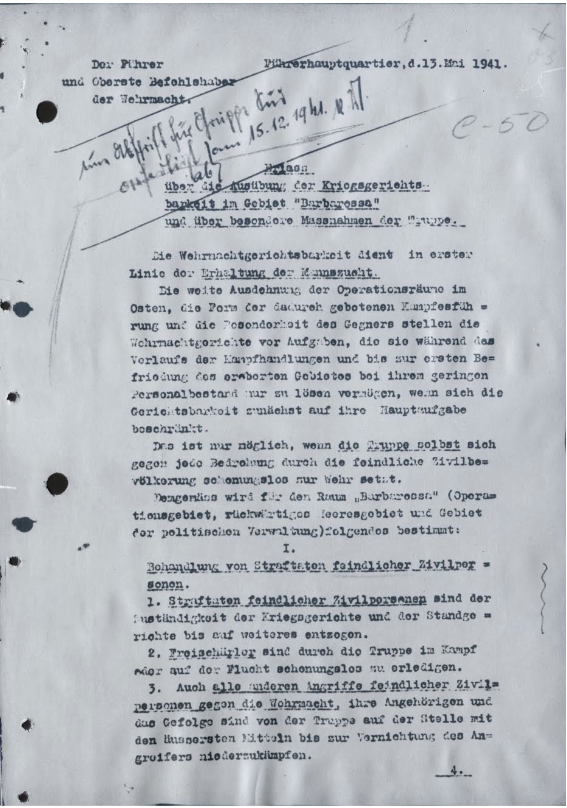 |
| A rare copy of the 13 May 1941 OKW order to troops in preparation for Operation Barbarossa (Russian Military Historical Society, Moscow, Russia). |
As translated, the 13 May 1941 order provides in pertinent part:
Persons [Russian civilians] suspected of criminal action will be brought at once before an officer. This officer will decide whether they are to be shot.
With regard to offences committed against enemy civilians by members of the Wehrmacht, prosecution is not obligatory....This broad order, under an interpretation, dispenses with due process completely and is contrary to every law of warfare regardless of specific treaties, and everyone within the Wehrmacht must realize this instantly - but it stands. Keitel will, on 27 June, order all copies of this infamous order destroyed, but the Soviets will obtain copies and retain them in the Kremlin.
 |
| Field Marshal Wilhelm Keitel, who distributed the OKW order of 13 May 1941. |
Pursuant to Stalin's expressed desire to attack the Reich, which he stated clearly on 5/6 May 1941, Soviet Defense Commissar Marshal Timoshenko and Zhukov submit a plan of operations. They project sending 152 divisions and over 3000 aircraft toward southern Poland. However, reviewing all the data of troop readiness and dispositions, Stalin decides against an attack at this time. He also rules against a general mobilization, though Soviet citizens are being called up in increasing numbers to serve in the armed forces.
British Military: Churchill's Tank Parliament meets at 10 Downing Street and reviews armored formation strategy for the defense of the British Isles, a German invasion still being considered an imminent threat. Churchill emphasizes the need for close cooperation between the RAF and tanks. In fact, he states that ground forces should have control over air operations and that "he would like a scheme prepared to equip as early as possible fourteen Army Co-operation Squadrons." These, he adds, "would then be completely at the disposal of the Army." Air Commodore Robert Goddard notes that equipping such squadrons, flying Blenheims, and Tomahawks, could only come at the expense of Bomber Command, but the decision is made and Lord Beaverbrook is instructed to begin the conversions.
The RAF refine their wireless navigation system known as Oboe. It is not ready for use yet. Oboe is a more sophisticated system of navigation than the current German systems that have proven effective, but easy to jam.
 |
| Bridgeport, Connecticut Municipal Wharf at Stratford Avenue, 13 May 1941 (National Archives No. 7290326). |
Churchill's main concern at this time is to prevent Hess from spreading his proposal to a wider audience. In a memo to Foreign Secretary Anthony Eden, Churchill calls Hess "potentially a war-criminal" and the other German leaders possibly "outlaws." This is one of the first indications that this is how the Allies intend to treat the German leaders after the war.
Churchill further states:
In the meanwhile [Hess] should be strictly isolated in a convenient house not too far from London, fitted by "C" [head of the Secret Intelligence Services Stuart Menzies] with the necessary appliances, and every endeavour should be made to study his mentality and get anything worthwhile out of him.Churchill emphasizes that Hess "should not have any contacts with the outer world or visitors except as prescribed by the Foreign Office." However, Churchill specifies that Hess "should be treated with dignity as if he were an important General who had fallen into our hands."
Churchill never meets with Hess despite the latter's repeated requests to do so. The former deputy fuehrer is kept in isolation and not informed of Churchill's adamant refusal to consider his proposal, instead of being allowed to believe that the offer was being actively considered. For the time being, Hess is kept isolated from all news and sources of outside information.
German Government: Adolf Hitler flies back to Berlin and addresses an emergency meeting of party functionaries. He announces that Martin Bormann has taken office as NSDAP Party Chancellor. Bormann will control all appointments to the NSDAP and access to Adolf Hitler from this point forward. This enrages others within the German government whose own power depends upon their access to the Fuhrer, but Hitler wants to free his hands for tighter control over military operations now that war with the Soviet Union is looming. This marks a major reorientation of German life from one in which the NSDAP is dominant to one in which the Wehrmacht becomes increasingly predominant.
 |
| View of the post incinerator at Camp Polk, Louisiana on 13 May 1941 (The Digital Collections of the National WWII Museum). |
China: The Battle of South Shanxi continues as the Japanese North China Front Army captures Tungfeng. The Japanese effectively have surrounded elements of the Chinese 1st War Area, which are ordered to break out to the north in any way possible. The Chinese begin to try to slip through Japanese lines in small groups.
Yugoslavian Homefront: The Glina massacres continue and come to a temporary conclusion. The Ustaše executes 100 Serb males in the nearby village of Prekopi. All told, roughly 260-300 Serbs have been killed in the previous few days (historians vary on their figures).
American Homefront: "Dangerous Moonlight," a typical wartime British propaganda drama directed by Desmond Horst, receives its US premiere via Republic Pictures under the title "Suicide Squadron." Future star Michael Rennie appears in a small role. The film, not very well remembered, is notable for aerial scenes of actual combat featuring RAF No. 74 Squadron, its planes featuring the unit's "ZD" marking. The film is a big success due less to its cinematic quality than its patriotic tale of a love story between a US female journalist (Sally Gray) and a Polish ace (Anton Walbrook) flying for the RAF.
Vic Ghezzi wins the PGA Championship.
 |
| Senta Berger, born on 13 May 1941. |
Senta Berger is born in Vienna, Austria. She goes on to marry director Michael Verhoeven and become a major film star in her own right. One of her more memorable films is Sam Peckinpah's "Cross of Iron" (1977), a searing look at soldiers during World War II that is a huge success in Germany. Senta continues to perform into the 21st Century and has won many awards for her acting.
 |
| Richard Valenzuela aka Ritchie Valens. |
May 1941
May 1, 1941: British Hold Tobruk
May 2, 1941: Anglo-Iraq War
May 3, 1941: Liverpool Hammered
May 4, 1941: Hitler Victory Speech
May 5, 1941: Patriots Day
May 6, 1941: Stalin In Command
May 7, 1941: May Blitz
May 8, 1941: Pinguin Sunk
May 9, 1941: U-110 Captured
May 10, 1941: Hess Flies Into History
May 11, 1941: The Hess Peace Plan
May 12, 1941: Tiger Arrives Safely
May 13, 1941: Keitel's Illegal Order
May 14, 1941: Holocaust in Paris
May 15, 1941: Operation Brevity
May 16, 1941: Blitz Ends
May 17, 1941: Habbaniya Relieved
May 18, 1941: Croatia Partitioned
May 19, 1941: Bismarck at Sea
May 20, 1941: Invasion of Crete
May 21, 1941: Robin Moore Sinking
May 22, 1941: Royal Navy Destruction Off Crete
May 23, 1941: Crete Must Be Won
May 24, 1941: Bismarck Sinks Hood
May 25, 1941: Lütjens' Brilliant Maneuver
May 26, 1941: Bismarck Stopped
May 27, 1941: Bismarck Sunk
May 28, 1941: Crete Lost
May 29, 1941: Royal Navy Mauled Off Crete
May 30, 1941: Sorge Warns, Stalin Ignores
May 31, 1941: British Take Baghdad
2020

